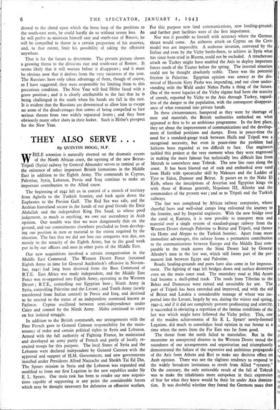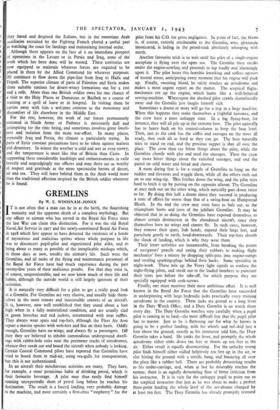THEY ALSO SERVE . . .
By QUINT1N HOGG, M.P.
WI-11LE attention is naturally rivetted on the dramatic events of the North African coast, the opening of the new BeirutTripoli (Syria) railway by General Alexander serves to remind us of the existence of other important British formations in the Middle East in addition to the Eighth Army. The commands in Cyprus, Palestine, Syria, Lebanon, Persia and Iraq continue to make an important contribution to the Allied cause.
The beginning of 1942 left us in control of a stretch of territory from Agheila to the Turkish frontier, and back again down the Euphrates to the Persian Gulf. The Red Sea was safe, and the Arabian hinterland secure in the hands of our good friends the Emir Abdullah and the independent King Ibn Saud, to whose good judgement, as much as anything, we owe our ascendency in Arab opinion. Our trouble was that we were dangerously thin on the ground, and our commitments elsewhere precluded us from developing our position in men or material to the extent required by the situation. The fact that we did not lose our conquests was due, not merely to the tenacity of the Eighth Army, but to the good work put in by our officers and men in other parts of the Middle East.
Our new acquisitions involved a certain reorganisation in the Middle East Command. The Western Desert Force (renamed Eighth Army in time for General Auchinleck's offensive in November, 1941) had long been divorced from the Base Command of B.T.E. East Africa was made independent, and the Middle East Force was re-organised into Eighth Army, operating in the Western Desert ; B.T.E., controlling our Egyptian base ; Ninth Army in Syria, controlling Palestine and the Levant ; and Tenth Army (newly transferred from Indian control) in Persia and Iraq, and destined to be erected to the status of an independent command known as Paiforce. Cyprus oscillated between semi-independence under Cairo and control by the Ninth Army. Malta continued to carry on her isolated struggle.
In addition to the British commands, eur arrangements with the Free French gave to General Catroux responsibility for the maintenance of order and certain political rights in Syria and Lebanon. Armed with the full authority of Fighting France, he maintained and developed an army partly of French and partly of locally recruited troops for this purpose. The local States of Syria and the Lebanon were declared independent by General Catroux with the approval and support of H.M. Government, and new governments installed under Presidents Alfred Naccache and Sheikh Taj Ed Din. The Spears mission in Syria and the Lebanon was expanded and modified to form our first Legation to the new republics under Sir E. L. Spears. Our main task has been to render our new acquisidons capable of supporting at any point the considerable forces which may be thought necessary for defensive or offensive warfare.
a
e
a a
a Ii a
For this purpose new land communications, new landing-grounds and further port facilities were of the first importance.
Nor was it possible to foretell with accuracy where the German thrust would come. An airborne attack on Cyprus on the Crete model was riot impossible. A seaborne invasion, convoyed by the Italian and even by the Vichy battle-fleets, to achieve in Syria what has since been tried in Bizerte, could not be excluded. A treacherous attack on Turkey might have enabled the Axis to deploy important forces south of the Taurus before the spring. The internal situation could not be thought absolutely stable. There was the potential friction in Palestine. Egyptian opinion was uneasy as the dismissal of Hussein Sirry Pasha was impending, and our close understanding with the Wafd under Nahas Pasha a thing of the future. One of the worst legacies of the Vichy regime had been the scarcity of cereals, exported by Vichy to the Axis through Turkey, regardless of the danger to the population, with the consequent disappearance of what remained into private hands.
In these circumstances, hampered as they were by shortage of men and materials, the British authorities embarked on what appeared at first to be an ambitious programme. In the first place, they set about the improvement of communications and the development of fortified positions and dumps. Even in peace-time the need for a standard-gauge track between Haifa and Tripoli was a recognised necessity, but even in peace-time the problem had hitherto been regarded as too difficult to face. Our engineers tackled this project at the very moment when they were engrossed in making the more fainous but technically less difficult line from Matruh to somewhere near Tobruk. The new line runs along the coast. It has been blasted out of rock and embanked over sand from Haifa with specatcular skill by Nakoura and the Ladder of Tyre to Sidon, Damour and Beirut. It passes on to the Nahr El Kelb, where the inscriptions of Assyrian and Egyptian kings vie with those of Roman generals, Napoleon III, Allenby and the commanders of the present war ; and so to Tripoli and the Turkish railways.
The line was completed by African railway companies, whose cheerful faces and well-sited camps long enlivened the journey to the frontier, and by Imperial engineers. With the new bridge over the canal at Kantara, it is now possible to transport men and material over a single system of standard-gauge railway from the t Western Desert through Palestine to Beirut and Tripoli, and thence via Horns and Aleppo to the Turkish frontier. Apart from more immediate advantages, this railway forms a permanent contribution to the communications between Europe and the Middle East comparable to the track across the Sinai Desert laid by General Allenby's men in the last war, which still forms part of the permanent link between Egypt and Palestine. 1'
II V
Roads, landing-grounds and ports have also come in for improvetI ment. The fighting of 194i left bridges down and surface destroyed even on the main coast road. The secondary road at Maj Arun had become a shell-pitted track. The roads from Tiberias to the Bekaa and Damascus were ruined and unsuitable for use. The a pott of Tripoli has been extended and improved, and with the aid of Beirut and Latakia a considerable tonnage of wheat was imported into the Levant, largely by sea, during the winter and spring, 1941-2, and if it did not completely prevent profiteering and scarcity, it succeeded in obviating a repetition of the famine conditions of the last war which might have followed the Vichy policy. This, one of the maiden achievements of Sir E. L. Spears' newly-formed Legation, did much to consolidate local opinion in our favour at a time when the news from the Far East was far from good.
The threat from the north failed to materialise. But in the meantime an unexpected disaster in the Western Desert tested the soundness of our arrangements and organisation and triumphantly demonstrated the failure of the expensive and ambitious propaganda of the Axis from Athens and Bari to make any decisive effect on Arab opinion. There was not the slightest tendency to respond to the widely broadcast invitations to revolt from Allied "tyranny.' On the contrary, the only noticeable result of the fall of Tobruk
was to make the inhabitants more outspoken in their expression of fear for what they knew would be their lot under Axis domination. It was doubtful whether they feared the Germans more than
they hated and despised the Italians, but in the meantime Arab auxiliaries recruited by the Fighting French played a useful part in watching the coast for landings and maintaining internal order.
Although there appears on the face of it no immediate prospect of operations in the Levant or in Persia and Iraq, none of the work which has been done will be wasted. These territories are now equipped to maintain whatever forces are required to be placed in them by the Allied Command for whatever purposes. Oil continues to flow down the pipe-line from Iraq to Haifa and Tripoli. The superior climate of parts of Palestine and Syria makes them suitable stations for desert-weary formations out for a rest and a refit. More than one British soldier owes his one chance of a visit to the Holy Places or Damascus or Baalbek to a course of training or a spell of leave or in hospital. In visiting them he carries away with him a welcome contrast to the monotony and discomfort of life elsewhere in the Middle East.
For the rest, however, the work of our forces permanently stationed in Ninth Army or Paiforce is necessarily dull and uninspiring for the time being, and sometimes involves great loneliness and isolation from the main war-effort. In many places, especially Iraq and Persia, the climate is particularly trying. In parts of Syria constant precautions have to be taken against malaria and dysentery. In winter the weather is cold and wet or even snowy, and the temperature is more like that of Britain than Cairo. In supporting these considerable hardships and embarrassments in exile bravely and ungrudgingly our officers and men there are as worthy of respect and gratitude as the more spectacular heroes of desert, air and sea. They will leave behind them in the Arab world more than the traditional affection inspired by the British soldier wherever he is found.























 Previous page
Previous page